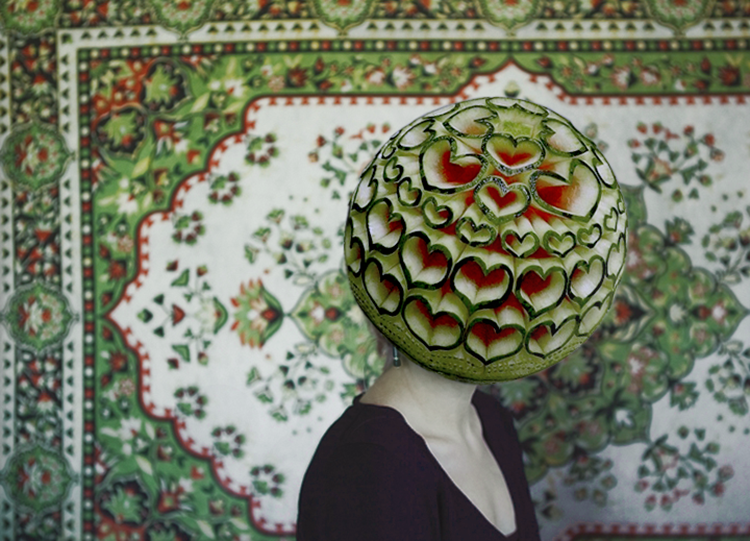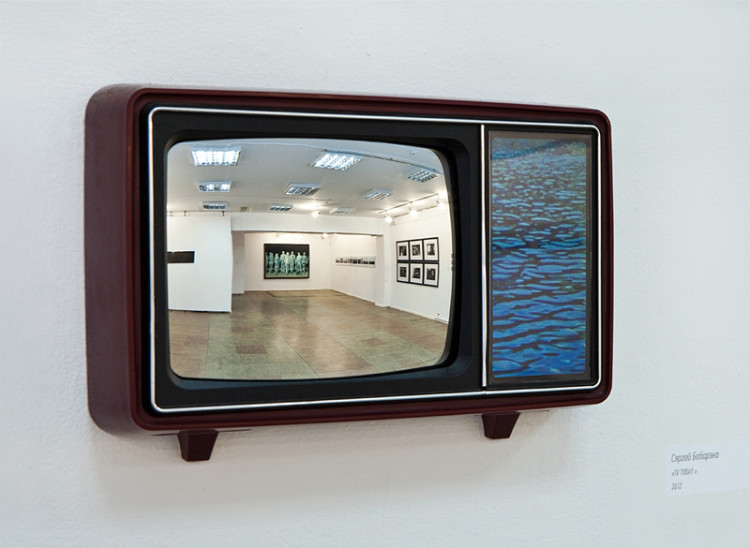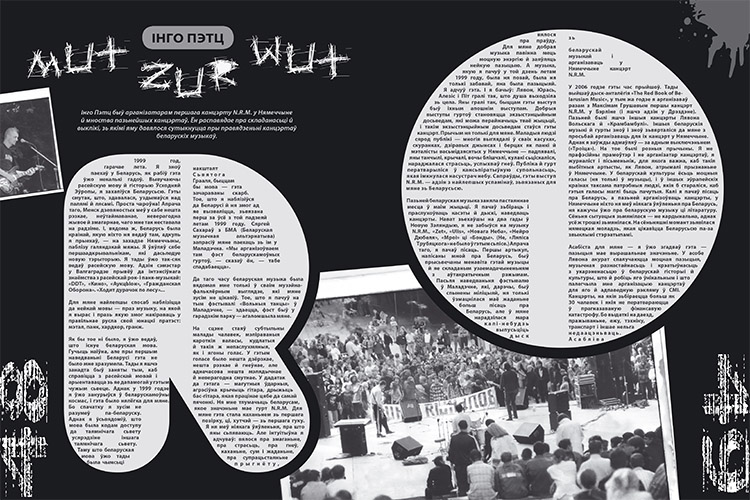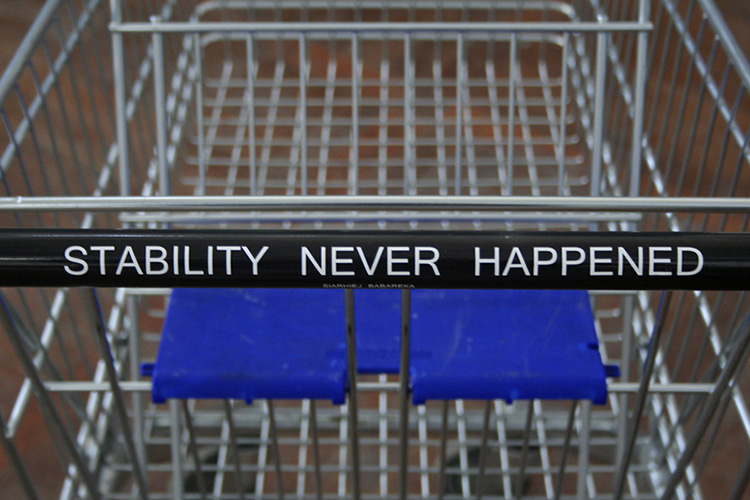
Аўтар: Valancin Akudović, 15/02/2016 | SPECIAL
TO CREATE A BRAND NEW UNKNOWN BELARUS
When together with Aleś Ancipienka at the beginning of the 2000s we were compiling The Anthology of Contemporary Belarusian Thinking [1], we did not really mean strengthening the foundations of the national idea as such. Our key message was to make the occurrence of the discourse of Belarusian thinking obvious in a variety of forms and concepts. At the same time, we can say that everything that was not initiated by us then — even metaphysics — was vaguely connected to the national idea. The endless thirst to have the Belarusian project realized «here and now» absorbed us completely. It was the time we were living in — and it was great!

Siarhiej Babareka. STABILITY NEVER HAPPENED, 2011. Handcart, Ready-made, © Wanzl Model EL75 2010
Naturally, the project was a romantic one, and it could be of no other nature then. Too unexpectadly everything turned into broken stone. From all the sides cold drafts were blowing and no time for reflections was left. The void that appeared needed to be urgently filled in with something. However, some common project vision was still present. It was taken as if by definition that the national idea was to replace the obsolete communist one. At least because it was done in such a way in all the countries of the former Soviet Union. But the fact that in our attempt to catch up with the Balts and Ukrainians we used the idea of the Renaissance as the basis of our own national project, as it would become clear in the course of years, was a conceptual mistake.
We did not have to revive (somehow a dim ghost remained from the former times), but to create a new Belarus, yet known to none of us. Unfortunately, even today that Renaissance phantom is still homelessly wandering in the basements of many minds unable to find its way out into the clear reality.
Probably for about twenty years now I personally have been trying to make the public understand that it is exclusively the Belarusian state emerging from the modus of this very country that could be put as our national project basis. But in no case, this project should be rooted to the ethnic background, primarily to the language. Language itself should be saved (can it still be saved, by the way?), but as for us, we somehow decided that the language is able to save the Belarusian nation as such.
By the way, the word combination «could be put» was thoughtlessly used by me, as a ridiculous habit of the Renaissance disabled ones, who still hope to live in the times that would be more favorable for their ideology… Already for more than 20 years, without really asking anyone, every day the Belarusian authority has been forming the Belarusian nation. It does it throught its foreign and domestic policies, public institutions and civil society organizations, with its money, prisons, borders and customs, TV channels, stadiums, parades and fireworks… Finally, through its «out of the format» President (Alexandr Lukashenko — editor’s note) and Mikoła Statkievič, who has been kept locked in prison by this very «out of format» and its own whims [2].
IT IS STUPID TO PLAY CATCH-UP WITH CONTEMPORANEITY
Dropping in on any church, you immediately get into the living reality of almost two thousand years ago. And will be definitely captured by the spiritual luxury of the past. But even without this «time machine» one would easily agree that for a few billion people across the globe even now for the perspective of existential being this very «church archaic» is perceived as much more relevant than any other super-contemporaneity. And in general, it is stupid to play catch-up with contemporaneity, because you never know where it heads toward.

Siarhiej Babareka. FORBBIDEN FRUIT, 2012. Private collection
What is really worthwhile worrying about is the revelant, and primarily for yourself. And if I am deeply concerned about the current Belarus, its people, language, literature, philosophy, then it is what I worry about, without dwelling on someone‘s civilizational leadership at the other end of the earth. And for a person of peace my difficulties are not relevant at all, in his global discourse he is concerned about something else. And it is also quite all right. By the way, the number of the Jews living worldwide is several times higher than the Jewish population of Israel, but this fact does not make the latter feel less concerned about their homeland. Certainly, total globalization has increased immensely not only the possibility of changing one’s place of residence, but also contributed to the growth of the quantity of nomads who tirelessly roam around the world having replaced their father’s estate with an endless set of hotels.
However, no matter how many of these ontological vagrants Belarus produces even in the long term, almost certainly there will always be enough of those who would prefer staying here. That is, for whom Belarus will remain that invisible church the essence of which will rest most relevant both in terms of their existential being and (then) ontological nothingness.
THE BLOODY PERIOD OF NATIONALISM HAS NEARLY COME TO AN END
Balkan events are terrible, but should one compare them with the disaster, which Turkish nationalism caused being responsible for Armenian genocide? And we can go on recalling examples… But why should we? All of us are perfectly aware of those horrors the dark side of nationalism keeps hidden. Nevertheless, let me ask you: had the peoples been more peaceful before nationalism actually appeared?
Mountains of heads chopped off by sweaty Tamerlane guys. Crusades of moronic knights to the luxurious lands of the Middle East. The thirst of carnivorous Spaniards for gold who slaughted like cattle hundreds of thousands of the Aztecs and thus put a bloody end to that unique civilization. What about the Massacre of St. Bartholomew’s Eve, and the Inquisition, and… And even the examples from not such a remote past. Even quite close to our times in the binary opposition with German Nazism there was a proletarian Stalinism, which caused many more troubles to people than Nazism did, if you count in millions… In short, when we link the evil only with a particular socio-political ideology or religion, we just deprive ourselves of courage to see it as an integral part of all the collapses of civilizations.

Siarhiej Babareka. TV-Today (TVT) 2012. Interactive Sculpture, private Collection
We cannot look at the history of humankind without having our teeth clenched. We must be predestined to witness evil, just like the future, before the end of the world. Islamic fundamentalism, which has now turned our civilization into a mined field, is its another evidence.
But getting back directly to nationalism, to my mind, its passionate (and hence bloody) period has nearly come to an end, at least on the European continent. As an example I would mention a current civilized struggle for the independence of the Catalans and the Scots. Moreover, the classical type of nationalism is quite likely to be gradually starting to get exhausted. As I said before and on a little bit different occasion: it still has a long life to live, but already a short term perspective. Therefore, it is high time to begin to think about the bright side of nationalism (national idea), which in Modern times gave a powerful impetus for a radical renewal first of the European peoples, and then of all the peoples of the earth.
What a magnificent picture — the emergence of numerous nations on all the continents! If to describe this movement in colors and sounds, I would compare it to two-centuries’ long holiday fireworks set all over the world.
Probably, it would be correct to end up these short notes with this pretentious rhetoric. But a warning about the dangerous tension the Belarusian nationalism might cause is still left unarticulated. Although at the moment this danger does not seem to manifest itself, if we pay no attention to those funny actions of silly teenagers’ directed towards our certain neighbors. However, the future is still far and anything can happen. Events in Ukraine again warn us against excessive optimism. But even if something nasty does happen to Belarus, nationalism is unlikely to be its direct prerequisite — rather just an umbrella.
In any case, to think that evil can be circumvented through some ideological precautions is simply to deceive ourselves. You’d better look up in the sky — the fireworks go on.
Valancin Akudovič is a Belarusian philosopher, poet and literary critic. He is the author of such books as «I am Absent. Reflections on the Ruins of the Human» (1998), «To Destroy Paris» (2004), «Conversations with God» (2006), «The Code of Absence» (2007), «The Book of Nothing» (2014) and others.
[1] The Anthology of Contemporary Belarusian Thinking. Saint-Petersburg. 2003. The collection of intellectual texts written in Belarus and abroad in the 1990s – early 2000s. Compiled by: V. Akudovič and A. Ancipienka. The anthology includes the articles written by V. Akudovič, A. Ancipienka, I.Babkoŭ, A.Biembiel, I.Burdzialova, S.Dubaviec, A.Klinaŭ, A. Razanaŭ, S.Sańka, A.Čobat, M.Ščur and others.
[2] After about five years in prison Mikola Statkievič as well as other 5 Belarusian political prisons was released from custody on August 22, 2015 by a special resolution of Belarusian President.
Translated by Volha Bubič
Opinions of authors do not always reflect the views of pARTisan. If you note any errors, please contact us right away.





